Analysis of PTSD in Frontline Workers During the COVID-19 Pandemic
VerifiedAdded on 2023/06/08
|9
|2111
|144
Report
AI Summary
This report delves into the prevalence and impact of Post-Traumatic Stress Disorder (PTSD) among frontline workers, particularly healthcare providers, who face traumatic and stressful situations. It highlights that PTSD is triggered by exposure to shocking or dangerous experiences, leading to symptoms such as flashbacks, nightmares, anxiety, and uncontrollable thoughts. The report notes the increased risk of PTSD among healthcare workers due to heavy workloads, lack of social support, and exposure to traumatic injuries and patient distress. It also addresses the impact of the COVID-19 pandemic, which has significantly affected the mental and physical health of frontline workers, leading to increased rates of PTSD and related psychological issues. The report emphasizes the need for prevention and management strategies to minimize the psychological impact on healthcare workers, who are essential in combating global health crises.

Executive summary
Paraphrase This Document
Need a fresh take? Get an instant paraphrase of this document with our AI Paraphraser

Table of Contents
Topic................................................................................................................................................1
Executive summary..........................................................................................................................1
REFERENCES................................................................................................................................5
Topic................................................................................................................................................1
Executive summary..........................................................................................................................1
REFERENCES................................................................................................................................5
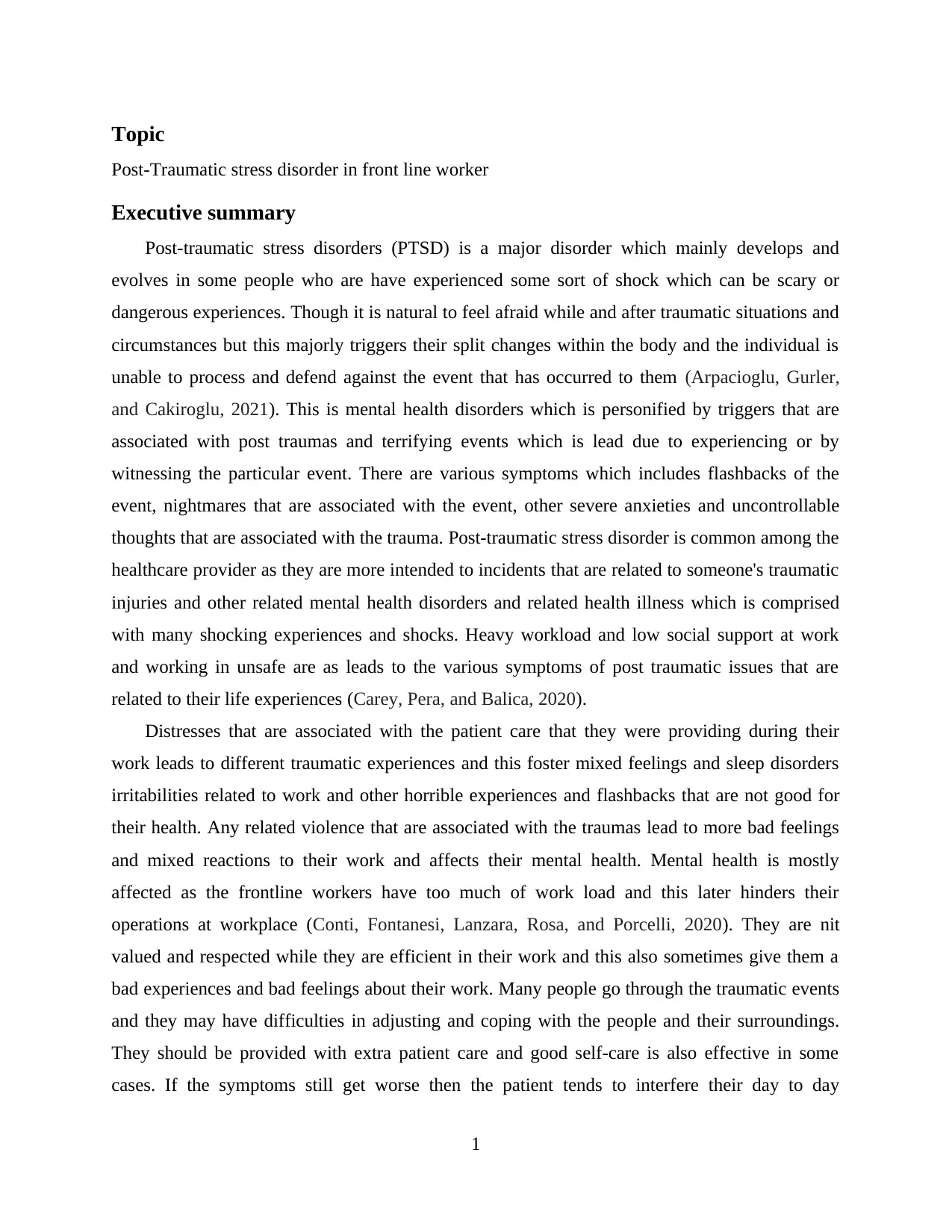
Topic
Post-Traumatic stress disorder in front line worker
Executive summary
Post-traumatic stress disorders (PTSD) is a major disorder which mainly develops and
evolves in some people who are have experienced some sort of shock which can be scary or
dangerous experiences. Though it is natural to feel afraid while and after traumatic situations and
circumstances but this majorly triggers their split changes within the body and the individual is
unable to process and defend against the event that has occurred to them (Arpacioglu, Gurler,
and Cakiroglu, 2021). This is mental health disorders which is personified by triggers that are
associated with post traumas and terrifying events which is lead due to experiencing or by
witnessing the particular event. There are various symptoms which includes flashbacks of the
event, nightmares that are associated with the event, other severe anxieties and uncontrollable
thoughts that are associated with the trauma. Post-traumatic stress disorder is common among the
healthcare provider as they are more intended to incidents that are related to someone's traumatic
injuries and other related mental health disorders and related health illness which is comprised
with many shocking experiences and shocks. Heavy workload and low social support at work
and working in unsafe are as leads to the various symptoms of post traumatic issues that are
related to their life experiences (Carey, Pera, and Balica, 2020).
Distresses that are associated with the patient care that they were providing during their
work leads to different traumatic experiences and this foster mixed feelings and sleep disorders
irritabilities related to work and other horrible experiences and flashbacks that are not good for
their health. Any related violence that are associated with the traumas lead to more bad feelings
and mixed reactions to their work and affects their mental health. Mental health is mostly
affected as the frontline workers have too much of work load and this later hinders their
operations at workplace (Conti, Fontanesi, Lanzara, Rosa, and Porcelli, 2020). They are nit
valued and respected while they are efficient in their work and this also sometimes give them a
bad experiences and bad feelings about their work. Many people go through the traumatic events
and they may have difficulties in adjusting and coping with the people and their surroundings.
They should be provided with extra patient care and good self-care is also effective in some
cases. If the symptoms still get worse then the patient tends to interfere their day to day
1
Post-Traumatic stress disorder in front line worker
Executive summary
Post-traumatic stress disorders (PTSD) is a major disorder which mainly develops and
evolves in some people who are have experienced some sort of shock which can be scary or
dangerous experiences. Though it is natural to feel afraid while and after traumatic situations and
circumstances but this majorly triggers their split changes within the body and the individual is
unable to process and defend against the event that has occurred to them (Arpacioglu, Gurler,
and Cakiroglu, 2021). This is mental health disorders which is personified by triggers that are
associated with post traumas and terrifying events which is lead due to experiencing or by
witnessing the particular event. There are various symptoms which includes flashbacks of the
event, nightmares that are associated with the event, other severe anxieties and uncontrollable
thoughts that are associated with the trauma. Post-traumatic stress disorder is common among the
healthcare provider as they are more intended to incidents that are related to someone's traumatic
injuries and other related mental health disorders and related health illness which is comprised
with many shocking experiences and shocks. Heavy workload and low social support at work
and working in unsafe are as leads to the various symptoms of post traumatic issues that are
related to their life experiences (Carey, Pera, and Balica, 2020).
Distresses that are associated with the patient care that they were providing during their
work leads to different traumatic experiences and this foster mixed feelings and sleep disorders
irritabilities related to work and other horrible experiences and flashbacks that are not good for
their health. Any related violence that are associated with the traumas lead to more bad feelings
and mixed reactions to their work and affects their mental health. Mental health is mostly
affected as the frontline workers have too much of work load and this later hinders their
operations at workplace (Conti, Fontanesi, Lanzara, Rosa, and Porcelli, 2020). They are nit
valued and respected while they are efficient in their work and this also sometimes give them a
bad experiences and bad feelings about their work. Many people go through the traumatic events
and they may have difficulties in adjusting and coping with the people and their surroundings.
They should be provided with extra patient care and good self-care is also effective in some
cases. If the symptoms still get worse then the patient tends to interfere their day to day
1
⊘ This is a preview!⊘
Do you want full access?
Subscribe today to unlock all pages.

Trusted by 1+ million students worldwide
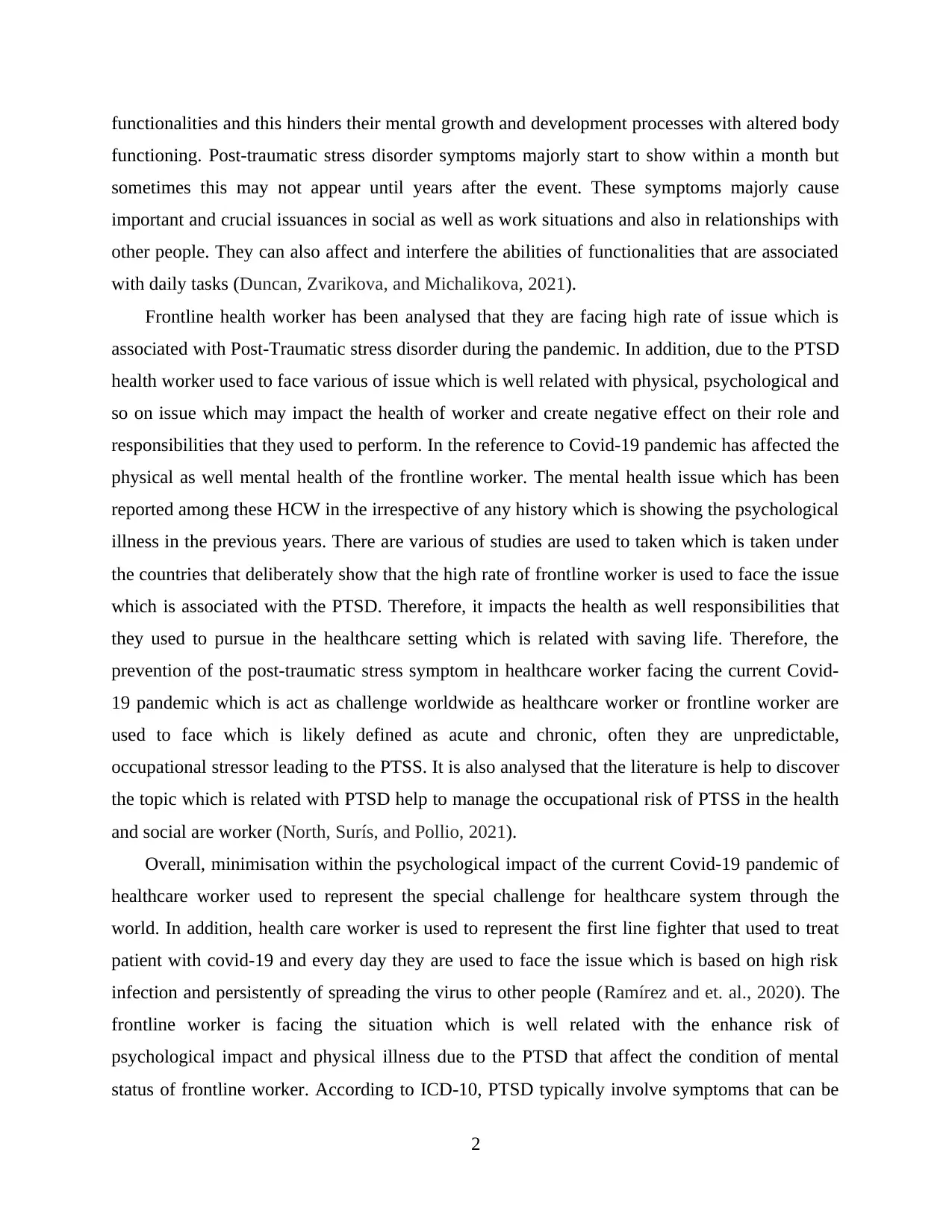
functionalities and this hinders their mental growth and development processes with altered body
functioning. Post-traumatic stress disorder symptoms majorly start to show within a month but
sometimes this may not appear until years after the event. These symptoms majorly cause
important and crucial issuances in social as well as work situations and also in relationships with
other people. They can also affect and interfere the abilities of functionalities that are associated
with daily tasks (Duncan, Zvarikova, and Michalikova, 2021).
Frontline health worker has been analysed that they are facing high rate of issue which is
associated with Post-Traumatic stress disorder during the pandemic. In addition, due to the PTSD
health worker used to face various of issue which is well related with physical, psychological and
so on issue which may impact the health of worker and create negative effect on their role and
responsibilities that they used to perform. In the reference to Covid-19 pandemic has affected the
physical as well mental health of the frontline worker. The mental health issue which has been
reported among these HCW in the irrespective of any history which is showing the psychological
illness in the previous years. There are various of studies are used to taken which is taken under
the countries that deliberately show that the high rate of frontline worker is used to face the issue
which is associated with the PTSD. Therefore, it impacts the health as well responsibilities that
they used to pursue in the healthcare setting which is related with saving life. Therefore, the
prevention of the post-traumatic stress symptom in healthcare worker facing the current Covid-
19 pandemic which is act as challenge worldwide as healthcare worker or frontline worker are
used to face which is likely defined as acute and chronic, often they are unpredictable,
occupational stressor leading to the PTSS. It is also analysed that the literature is help to discover
the topic which is related with PTSD help to manage the occupational risk of PTSS in the health
and social are worker (North, Surís, and Pollio, 2021).
Overall, minimisation within the psychological impact of the current Covid-19 pandemic of
healthcare worker used to represent the special challenge for healthcare system through the
world. In addition, health care worker is used to represent the first line fighter that used to treat
patient with covid-19 and every day they are used to face the issue which is based on high risk
infection and persistently of spreading the virus to other people (Ramírez and et. al., 2020). The
frontline worker is facing the situation which is well related with the enhance risk of
psychological impact and physical illness due to the PTSD that affect the condition of mental
status of frontline worker. According to ICD-10, PTSD typically involve symptoms that can be
2
functioning. Post-traumatic stress disorder symptoms majorly start to show within a month but
sometimes this may not appear until years after the event. These symptoms majorly cause
important and crucial issuances in social as well as work situations and also in relationships with
other people. They can also affect and interfere the abilities of functionalities that are associated
with daily tasks (Duncan, Zvarikova, and Michalikova, 2021).
Frontline health worker has been analysed that they are facing high rate of issue which is
associated with Post-Traumatic stress disorder during the pandemic. In addition, due to the PTSD
health worker used to face various of issue which is well related with physical, psychological and
so on issue which may impact the health of worker and create negative effect on their role and
responsibilities that they used to perform. In the reference to Covid-19 pandemic has affected the
physical as well mental health of the frontline worker. The mental health issue which has been
reported among these HCW in the irrespective of any history which is showing the psychological
illness in the previous years. There are various of studies are used to taken which is taken under
the countries that deliberately show that the high rate of frontline worker is used to face the issue
which is associated with the PTSD. Therefore, it impacts the health as well responsibilities that
they used to pursue in the healthcare setting which is related with saving life. Therefore, the
prevention of the post-traumatic stress symptom in healthcare worker facing the current Covid-
19 pandemic which is act as challenge worldwide as healthcare worker or frontline worker are
used to face which is likely defined as acute and chronic, often they are unpredictable,
occupational stressor leading to the PTSS. It is also analysed that the literature is help to discover
the topic which is related with PTSD help to manage the occupational risk of PTSS in the health
and social are worker (North, Surís, and Pollio, 2021).
Overall, minimisation within the psychological impact of the current Covid-19 pandemic of
healthcare worker used to represent the special challenge for healthcare system through the
world. In addition, health care worker is used to represent the first line fighter that used to treat
patient with covid-19 and every day they are used to face the issue which is based on high risk
infection and persistently of spreading the virus to other people (Ramírez and et. al., 2020). The
frontline worker is facing the situation which is well related with the enhance risk of
psychological impact and physical illness due to the PTSD that affect the condition of mental
status of frontline worker. According to ICD-10, PTSD typically involve symptoms that can be
2
Paraphrase This Document
Need a fresh take? Get an instant paraphrase of this document with our AI Paraphraser
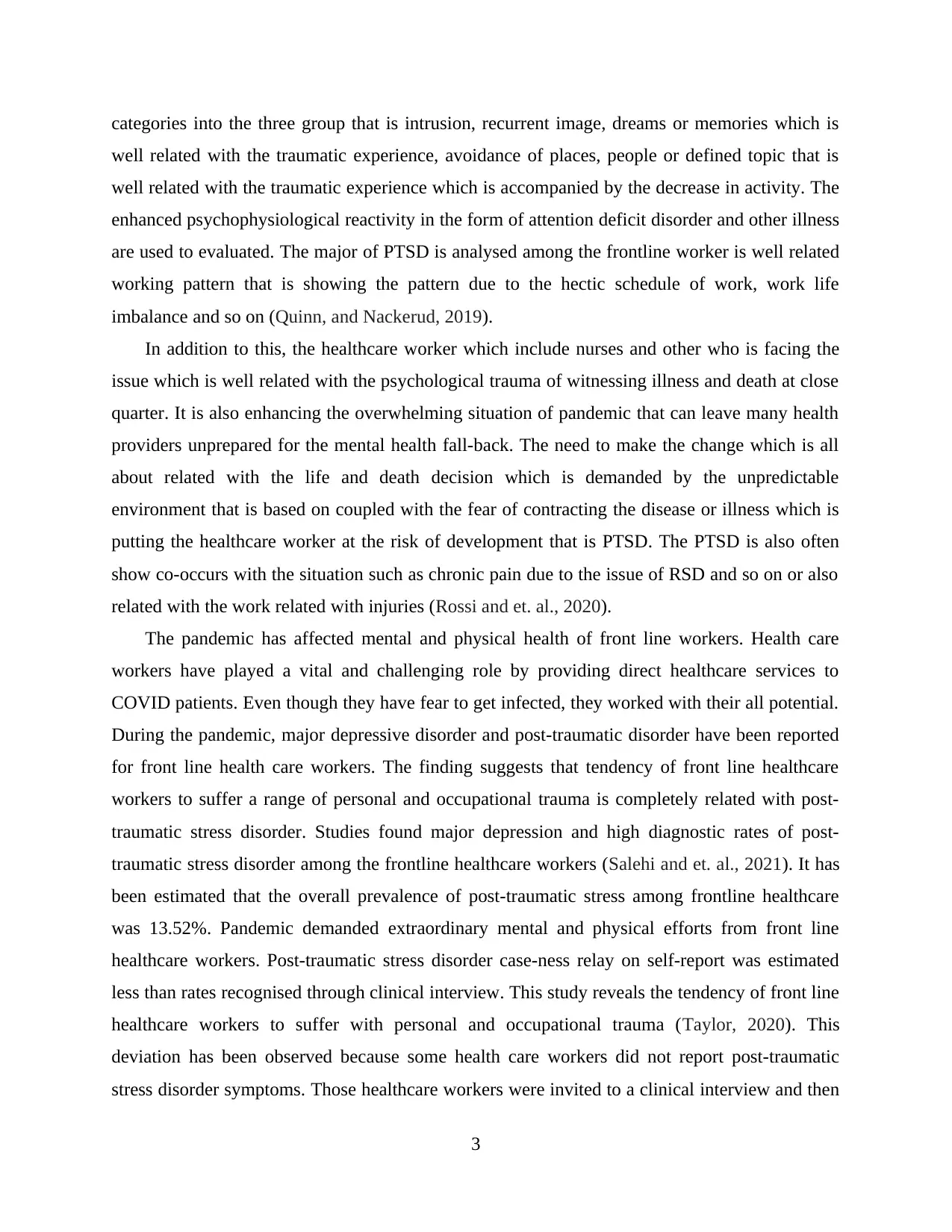
categories into the three group that is intrusion, recurrent image, dreams or memories which is
well related with the traumatic experience, avoidance of places, people or defined topic that is
well related with the traumatic experience which is accompanied by the decrease in activity. The
enhanced psychophysiological reactivity in the form of attention deficit disorder and other illness
are used to evaluated. The major of PTSD is analysed among the frontline worker is well related
working pattern that is showing the pattern due to the hectic schedule of work, work life
imbalance and so on (Quinn, and Nackerud, 2019).
In addition to this, the healthcare worker which include nurses and other who is facing the
issue which is well related with the psychological trauma of witnessing illness and death at close
quarter. It is also enhancing the overwhelming situation of pandemic that can leave many health
providers unprepared for the mental health fall-back. The need to make the change which is all
about related with the life and death decision which is demanded by the unpredictable
environment that is based on coupled with the fear of contracting the disease or illness which is
putting the healthcare worker at the risk of development that is PTSD. The PTSD is also often
show co-occurs with the situation such as chronic pain due to the issue of RSD and so on or also
related with the work related with injuries (Rossi and et. al., 2020).
The pandemic has affected mental and physical health of front line workers. Health care
workers have played a vital and challenging role by providing direct healthcare services to
COVID patients. Even though they have fear to get infected, they worked with their all potential.
During the pandemic, major depressive disorder and post-traumatic disorder have been reported
for front line health care workers. The finding suggests that tendency of front line healthcare
workers to suffer a range of personal and occupational trauma is completely related with post-
traumatic stress disorder. Studies found major depression and high diagnostic rates of post-
traumatic stress disorder among the frontline healthcare workers (Salehi and et. al., 2021). It has
been estimated that the overall prevalence of post-traumatic stress among frontline healthcare
was 13.52%. Pandemic demanded extraordinary mental and physical efforts from front line
healthcare workers. Post-traumatic stress disorder case-ness relay on self-report was estimated
less than rates recognised through clinical interview. This study reveals the tendency of front line
healthcare workers to suffer with personal and occupational trauma (Taylor, 2020). This
deviation has been observed because some health care workers did not report post-traumatic
stress disorder symptoms. Those healthcare workers were invited to a clinical interview and then
3
well related with the traumatic experience, avoidance of places, people or defined topic that is
well related with the traumatic experience which is accompanied by the decrease in activity. The
enhanced psychophysiological reactivity in the form of attention deficit disorder and other illness
are used to evaluated. The major of PTSD is analysed among the frontline worker is well related
working pattern that is showing the pattern due to the hectic schedule of work, work life
imbalance and so on (Quinn, and Nackerud, 2019).
In addition to this, the healthcare worker which include nurses and other who is facing the
issue which is well related with the psychological trauma of witnessing illness and death at close
quarter. It is also enhancing the overwhelming situation of pandemic that can leave many health
providers unprepared for the mental health fall-back. The need to make the change which is all
about related with the life and death decision which is demanded by the unpredictable
environment that is based on coupled with the fear of contracting the disease or illness which is
putting the healthcare worker at the risk of development that is PTSD. The PTSD is also often
show co-occurs with the situation such as chronic pain due to the issue of RSD and so on or also
related with the work related with injuries (Rossi and et. al., 2020).
The pandemic has affected mental and physical health of front line workers. Health care
workers have played a vital and challenging role by providing direct healthcare services to
COVID patients. Even though they have fear to get infected, they worked with their all potential.
During the pandemic, major depressive disorder and post-traumatic disorder have been reported
for front line health care workers. The finding suggests that tendency of front line healthcare
workers to suffer a range of personal and occupational trauma is completely related with post-
traumatic stress disorder. Studies found major depression and high diagnostic rates of post-
traumatic stress disorder among the frontline healthcare workers (Salehi and et. al., 2021). It has
been estimated that the overall prevalence of post-traumatic stress among frontline healthcare
was 13.52%. Pandemic demanded extraordinary mental and physical efforts from front line
healthcare workers. Post-traumatic stress disorder case-ness relay on self-report was estimated
less than rates recognised through clinical interview. This study reveals the tendency of front line
healthcare workers to suffer with personal and occupational trauma (Taylor, 2020). This
deviation has been observed because some health care workers did not report post-traumatic
stress disorder symptoms. Those healthcare workers were invited to a clinical interview and then
3
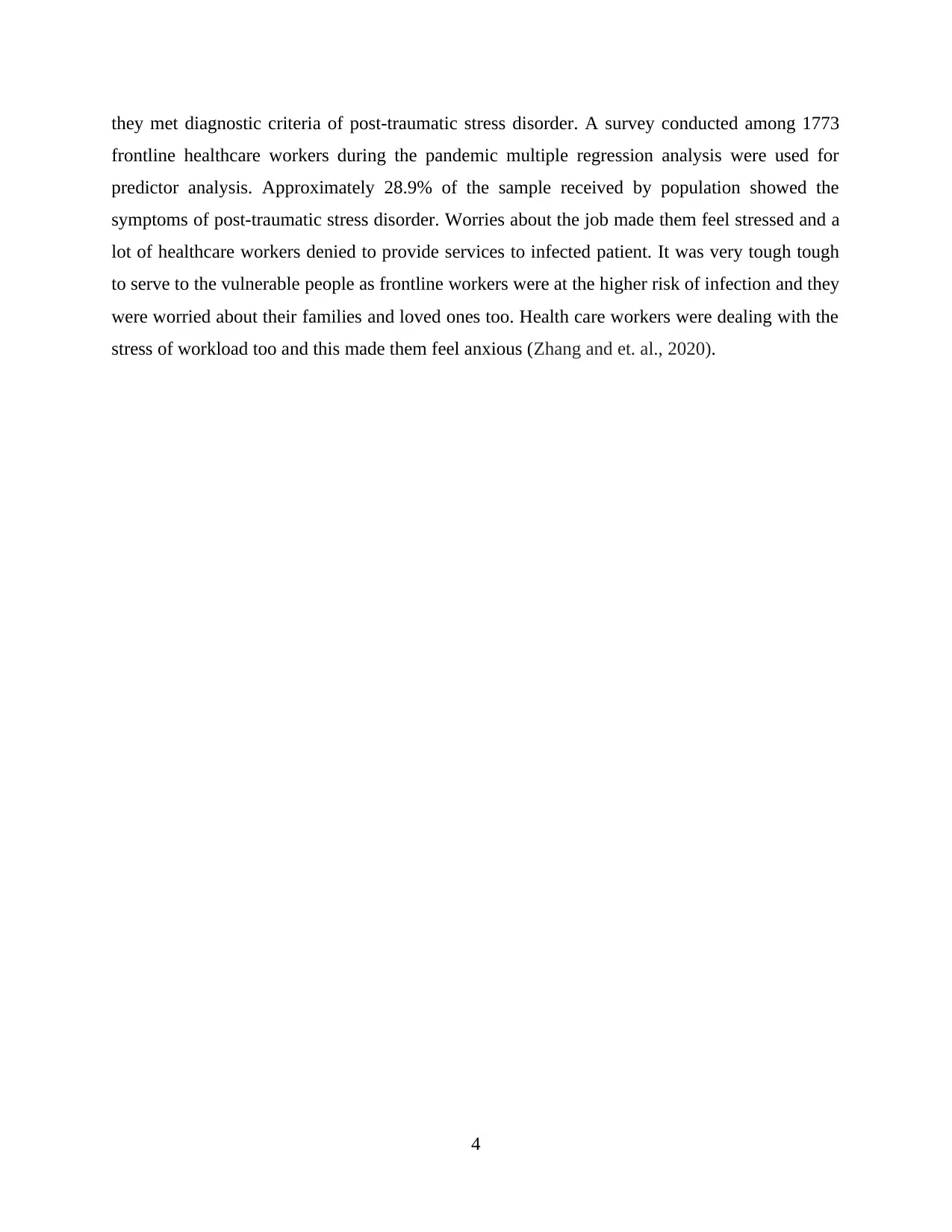
they met diagnostic criteria of post-traumatic stress disorder. A survey conducted among 1773
frontline healthcare workers during the pandemic multiple regression analysis were used for
predictor analysis. Approximately 28.9% of the sample received by population showed the
symptoms of post-traumatic stress disorder. Worries about the job made them feel stressed and a
lot of healthcare workers denied to provide services to infected patient. It was very tough tough
to serve to the vulnerable people as frontline workers were at the higher risk of infection and they
were worried about their families and loved ones too. Health care workers were dealing with the
stress of workload too and this made them feel anxious (Zhang and et. al., 2020).
4
frontline healthcare workers during the pandemic multiple regression analysis were used for
predictor analysis. Approximately 28.9% of the sample received by population showed the
symptoms of post-traumatic stress disorder. Worries about the job made them feel stressed and a
lot of healthcare workers denied to provide services to infected patient. It was very tough tough
to serve to the vulnerable people as frontline workers were at the higher risk of infection and they
were worried about their families and loved ones too. Health care workers were dealing with the
stress of workload too and this made them feel anxious (Zhang and et. al., 2020).
4
⊘ This is a preview!⊘
Do you want full access?
Subscribe today to unlock all pages.

Trusted by 1+ million students worldwide
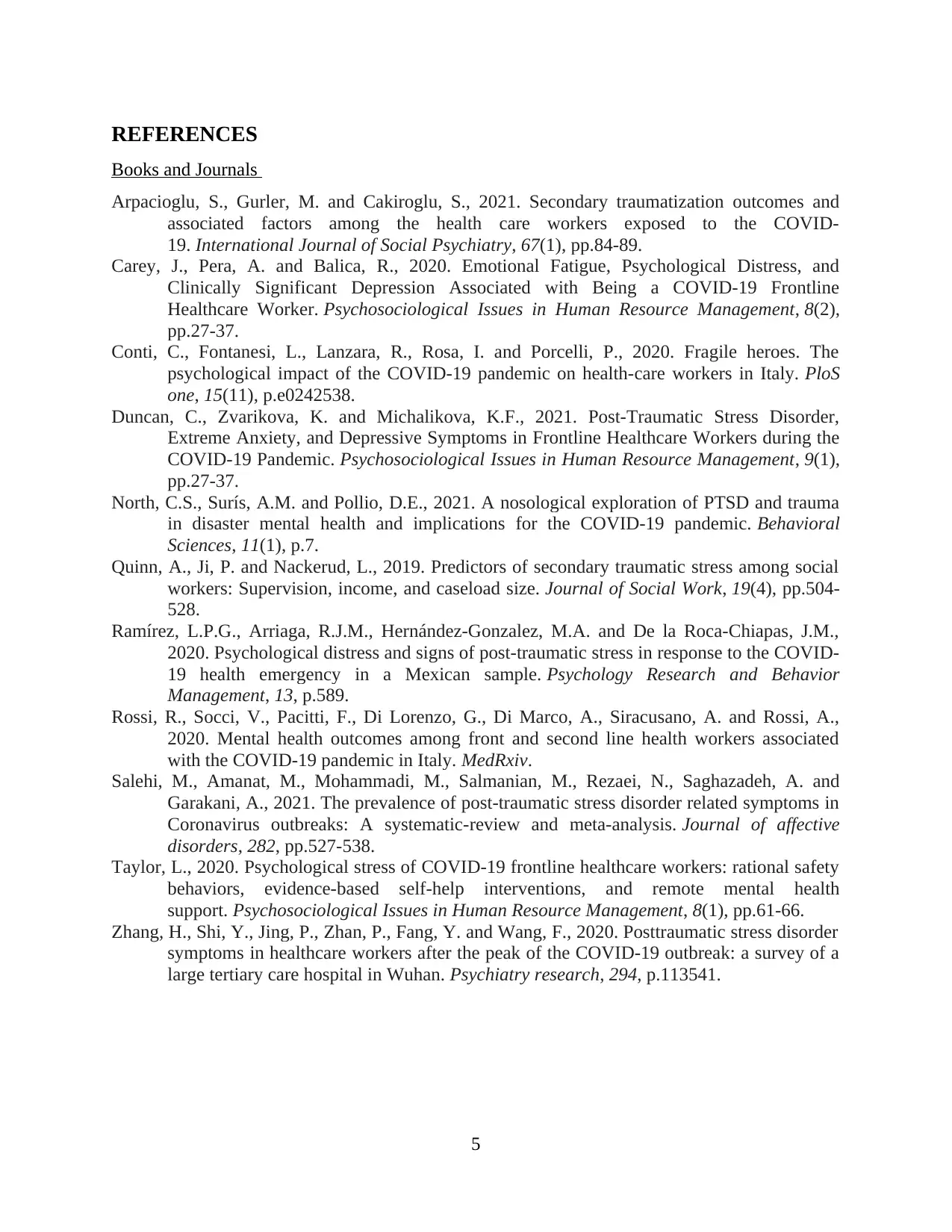
REFERENCES
Books and Journals
Arpacioglu, S., Gurler, M. and Cakiroglu, S., 2021. Secondary traumatization outcomes and
associated factors among the health care workers exposed to the COVID-
19. International Journal of Social Psychiatry, 67(1), pp.84-89.
Carey, J., Pera, A. and Balica, R., 2020. Emotional Fatigue, Psychological Distress, and
Clinically Significant Depression Associated with Being a COVID-19 Frontline
Healthcare Worker. Psychosociological Issues in Human Resource Management, 8(2),
pp.27-37.
Conti, C., Fontanesi, L., Lanzara, R., Rosa, I. and Porcelli, P., 2020. Fragile heroes. The
psychological impact of the COVID-19 pandemic on health-care workers in Italy. PloS
one, 15(11), p.e0242538.
Duncan, C., Zvarikova, K. and Michalikova, K.F., 2021. Post-Traumatic Stress Disorder,
Extreme Anxiety, and Depressive Symptoms in Frontline Healthcare Workers during the
COVID-19 Pandemic. Psychosociological Issues in Human Resource Management, 9(1),
pp.27-37.
North, C.S., Surís, A.M. and Pollio, D.E., 2021. A nosological exploration of PTSD and trauma
in disaster mental health and implications for the COVID-19 pandemic. Behavioral
Sciences, 11(1), p.7.
Quinn, A., Ji, P. and Nackerud, L., 2019. Predictors of secondary traumatic stress among social
workers: Supervision, income, and caseload size. Journal of Social Work, 19(4), pp.504-
528.
Ramírez, L.P.G., Arriaga, R.J.M., Hernández-Gonzalez, M.A. and De la Roca-Chiapas, J.M.,
2020. Psychological distress and signs of post-traumatic stress in response to the COVID-
19 health emergency in a Mexican sample. Psychology Research and Behavior
Management, 13, p.589.
Rossi, R., Socci, V., Pacitti, F., Di Lorenzo, G., Di Marco, A., Siracusano, A. and Rossi, A.,
2020. Mental health outcomes among front and second line health workers associated
with the COVID-19 pandemic in Italy. MedRxiv.
Salehi, M., Amanat, M., Mohammadi, M., Salmanian, M., Rezaei, N., Saghazadeh, A. and
Garakani, A., 2021. The prevalence of post-traumatic stress disorder related symptoms in
Coronavirus outbreaks: A systematic-review and meta-analysis. Journal of affective
disorders, 282, pp.527-538.
Taylor, L., 2020. Psychological stress of COVID-19 frontline healthcare workers: rational safety
behaviors, evidence-based self-help interventions, and remote mental health
support. Psychosociological Issues in Human Resource Management, 8(1), pp.61-66.
Zhang, H., Shi, Y., Jing, P., Zhan, P., Fang, Y. and Wang, F., 2020. Posttraumatic stress disorder
symptoms in healthcare workers after the peak of the COVID-19 outbreak: a survey of a
large tertiary care hospital in Wuhan. Psychiatry research, 294, p.113541.
5
Books and Journals
Arpacioglu, S., Gurler, M. and Cakiroglu, S., 2021. Secondary traumatization outcomes and
associated factors among the health care workers exposed to the COVID-
19. International Journal of Social Psychiatry, 67(1), pp.84-89.
Carey, J., Pera, A. and Balica, R., 2020. Emotional Fatigue, Psychological Distress, and
Clinically Significant Depression Associated with Being a COVID-19 Frontline
Healthcare Worker. Psychosociological Issues in Human Resource Management, 8(2),
pp.27-37.
Conti, C., Fontanesi, L., Lanzara, R., Rosa, I. and Porcelli, P., 2020. Fragile heroes. The
psychological impact of the COVID-19 pandemic on health-care workers in Italy. PloS
one, 15(11), p.e0242538.
Duncan, C., Zvarikova, K. and Michalikova, K.F., 2021. Post-Traumatic Stress Disorder,
Extreme Anxiety, and Depressive Symptoms in Frontline Healthcare Workers during the
COVID-19 Pandemic. Psychosociological Issues in Human Resource Management, 9(1),
pp.27-37.
North, C.S., Surís, A.M. and Pollio, D.E., 2021. A nosological exploration of PTSD and trauma
in disaster mental health and implications for the COVID-19 pandemic. Behavioral
Sciences, 11(1), p.7.
Quinn, A., Ji, P. and Nackerud, L., 2019. Predictors of secondary traumatic stress among social
workers: Supervision, income, and caseload size. Journal of Social Work, 19(4), pp.504-
528.
Ramírez, L.P.G., Arriaga, R.J.M., Hernández-Gonzalez, M.A. and De la Roca-Chiapas, J.M.,
2020. Psychological distress and signs of post-traumatic stress in response to the COVID-
19 health emergency in a Mexican sample. Psychology Research and Behavior
Management, 13, p.589.
Rossi, R., Socci, V., Pacitti, F., Di Lorenzo, G., Di Marco, A., Siracusano, A. and Rossi, A.,
2020. Mental health outcomes among front and second line health workers associated
with the COVID-19 pandemic in Italy. MedRxiv.
Salehi, M., Amanat, M., Mohammadi, M., Salmanian, M., Rezaei, N., Saghazadeh, A. and
Garakani, A., 2021. The prevalence of post-traumatic stress disorder related symptoms in
Coronavirus outbreaks: A systematic-review and meta-analysis. Journal of affective
disorders, 282, pp.527-538.
Taylor, L., 2020. Psychological stress of COVID-19 frontline healthcare workers: rational safety
behaviors, evidence-based self-help interventions, and remote mental health
support. Psychosociological Issues in Human Resource Management, 8(1), pp.61-66.
Zhang, H., Shi, Y., Jing, P., Zhan, P., Fang, Y. and Wang, F., 2020. Posttraumatic stress disorder
symptoms in healthcare workers after the peak of the COVID-19 outbreak: a survey of a
large tertiary care hospital in Wuhan. Psychiatry research, 294, p.113541.
5
Paraphrase This Document
Need a fresh take? Get an instant paraphrase of this document with our AI Paraphraser

6

7
⊘ This is a preview!⊘
Do you want full access?
Subscribe today to unlock all pages.

Trusted by 1+ million students worldwide
1 out of 9
Related Documents
Your All-in-One AI-Powered Toolkit for Academic Success.
+13062052269
info@desklib.com
Available 24*7 on WhatsApp / Email
![[object Object]](/_next/static/media/star-bottom.7253800d.svg)
Unlock your academic potential
Copyright © 2020–2025 A2Z Services. All Rights Reserved. Developed and managed by ZUCOL.



